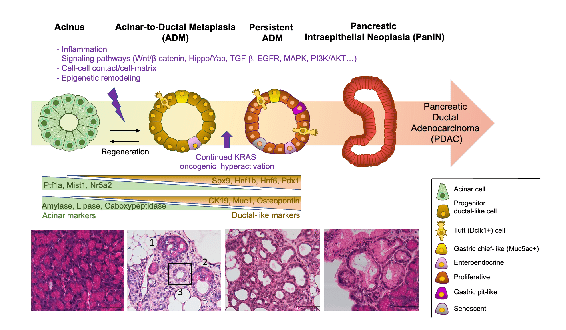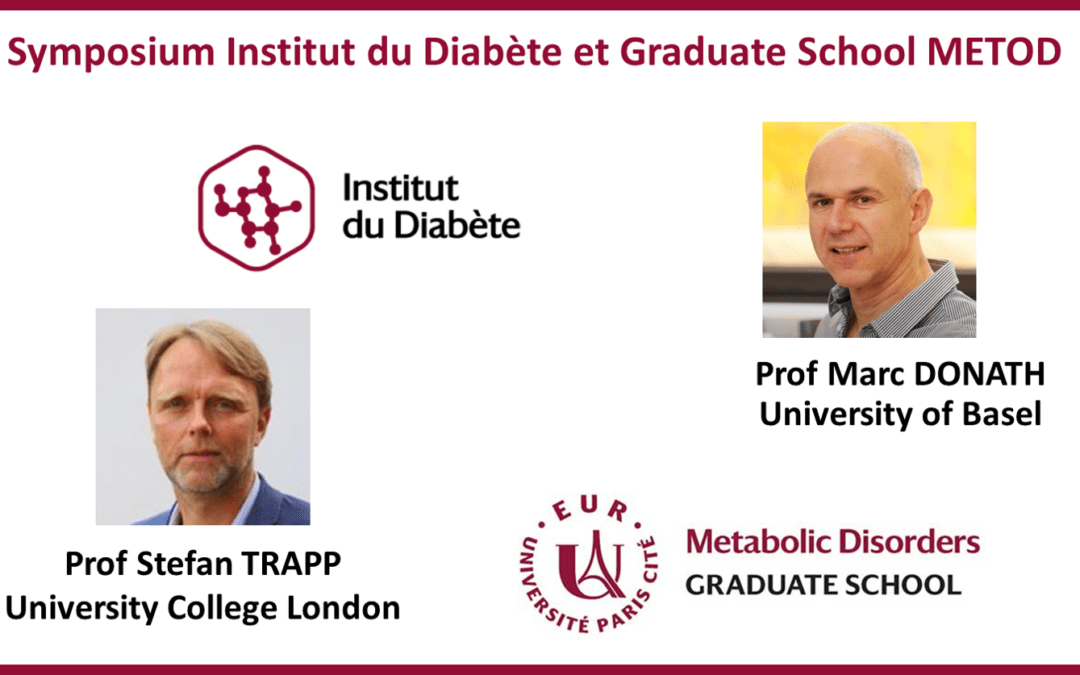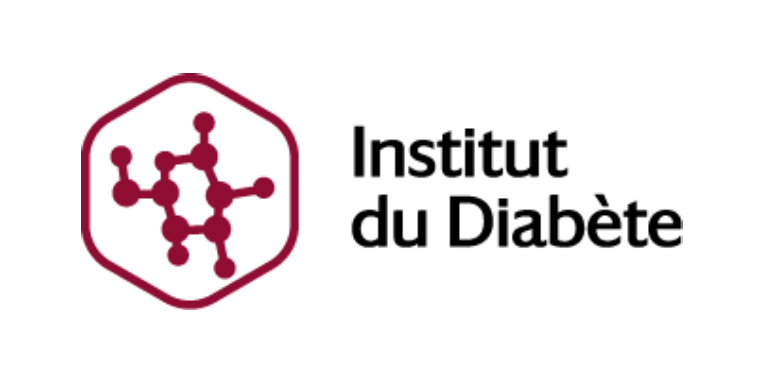From inflammation to cancer in digestive diseases
PI : Valérie Paradis & Alain Couvineau
The team investigates the impact of metabolic syndrome (MS) and obesity on the development of pancreatic precancerous lesions, aiming to shed light on this critical area and advance future interventions

From left to right: DL Diane Lorenzo, AnC Anne Couvelard, AlC Alain Couvineau, PN Pascal Nicole, JC Jérôme Cros, CH Cécile Haumaitre, TV Thierry Voisin, VG Valérie Gratio, SF Sonia Frendi, VR Vinciane Rebours.
Our research team is dedicated to understanding the intricate relationship between metabolic syndrome (MS) and chronic digestive diseases. We unite scientists and clinicians in basic and translational research aimed at addressing the pressing public health challenges posed by inflammatory-related disorders affecting the pancreas, which significantly contribute to the rise in cancer incidences. Our focus revolves around investigating the pathophysiology of the inflammation-cancer continuum within the pancreas.
We specifically study the roles of obesity and diabetes in the progression of early neoplastic lesions from acinar cell to acinar-to-ductal metaplasia and PanIN, before the progression to pancreatic adenocarcinoma, in ex vivo models (precision cut slices of pancreatic parenchyma), in animal models (obese wistar, GK rats under HFD (High fat diet), treated by caloric restriction or bariatric surgery or genetically engineered mouse models (GEEM) with high-fat diet (HFD) or not) and in patients. We try to correlate lesions to specific new imaging sequences by MRI (Magnetic resonance imaging) in both animal and humans to be able to better detect very early cancer.
We are also interested on identifying potential therapeutic targets in this context. Our results show that the orexin receptor OX1R is expressed in pancreatic cancer, whereas it is not in healthy tissue. Activation of this receptor by orexin-A (OxA) induces mitochondrial apoptosis in pancreatic cancer, leading to a potent antitumoral effect. We are studying the impact of OxA on HFD mouse models, determining its impact notably on insulin resistance, fat mass, fatty infiltrate in the pancreas, cytokine or adipokine secretion, mitochondrial metabolism.
By delving into the cellular and molecular mechanisms underlying initiation and progression of pancreatic preneoplasia, our goal is to deepen our understanding and uncover novel therapeutic strategies.
Selected publications
- Marstrand-Daucé L, Lorenzo D, Chassac A, Nicole P, Couvelard A, Haumaitre C. Acinar-to-Ductal Metaplasia (ADM): On the Road to Pancreatic Intraepithelial Neoplasia (PanIN) and Pancreatic Cancer. Int J Mol Sci. 2023 Jun 9;24(12):9946.
- Saillard C, Delecourt F, Schmauch B, Moindrot O, Svrcek M, Bardier-Dupas A, Emile JF, Ayadi M, Rebours V, de Mestier L, Hammel P, Neuzillet C, Bachet JB, Iovanna J, Dusetti N, Blum Y, Richard M, Kermezli Y, Paradis V, Zaslavskiy M, Courtiol P, Kamoun A, Nicolle R, Cros J. Pacpaint: a histology-based deep learning model uncovers the extensive intratumor molecular heterogeneity of pancreatic adenocarcinoma. Nat Commun. 2023 Jun 13;14(1):3459.
- Gratio V, Dayot S, Benadda S, Nicole P, Saveanu L, Voisin T, Couvineau A. Imaging flow cytometry of tumoroids: A new method for studying GPCR expression. Cytometry A. 2023 Nov 28.
- Depoilly T, Leroux R, Andrade D, Nicolle R, Dioguardi Burgio M, Marinoni I, Dokmak S, Ruszniewski P, Hentic O, Paradis V, De Mestier L, Perren A, Couvelard A, Cros J. Immunophenotypic and molecular characterization of pancreatic neuroendocrine tumors producing serotonin. Mod Pathol. 2022 Nov;35(11):1713-1722.
- Voisin T, Nicole P, Gratio V, Chassac A, Mansour D, Rebours V, Couvelard A, Couvineau A. The Orexin-A/OX1R System Induces Cell Death in Pancreatic Cancer Cells Resistant to Gemcitabine and Nab-Paclitaxel Treatment. Front Oncol. 2022 Jun 7;12:904327.
- Couvineau A, Voisin T, Nicole P, Gratio V, Blais A. Orexins: A promising target to digestive cancers, inflammation, obesity and metabolism dysfunctions. World J Gastroenterol. 2021 Nov 28;27(44):7582-7596.
- Quilichini E, Fabre M, Nord C, Dirami T, Le Marec A, Cereghini S, Pasek RC, Gannon M, Ahlgren U, Haumaitre C. Insights into the etiology and physiopathology of MODY5/HNF1B pancreatic phenotype with a mouse model of the human disease. J Pathol. 2021 May;254(1):31-45.
- Laouirem S, Sannier A, Norkowski E, Cauchy F, Doblas S, Rautou PE, Albuquerque M, Garteiser P, Sognigbé L, Raffenne J, van Beers BE, Soubrane O, Bedossa P, Cros J, Paradis V. Endothelial fatty liver binding protein 4: a new targetable mediator in hepatocellular carcinoma related to metabolic syndrome. Oncogene. 2019 Apr;38(16):3033-3046.
- Quilichini E, Fabre M, Dirami T, Stedman A, De Vas M, Ozguc O, Pasek RC, Cereghini S, Morillon L, Guerra C, Couvelard A, Gannon M, Haumaitre C. Pancreatic Ductal Deletion of Hnf1b Disrupts Exocrine Homeostasis, Leads to Pancreatitis and Facilitates Tumorigenesis. Cell Mol Gastroenterol Hepatol. 2019;8(3):487-511.
- Rebours V, Garteiser P, Ribeiro-Parenti L, Cavin JB, Doblas S, Pagé G, Bado A, Couvineau A, Ruszniewski P, Paradis V, Le Gall M, Van Beers BE, Couvelard A. Obesity-induced pancreatopathy in rats is reversible after bariatric surgery. Sci Rep. 2018 Nov 2;8(1):16295.
- Messal N, Fernandez N, Dayot S, Gratio V, Nicole P, Prochasson C, Chantret I, LeGuilloux G, Jarry A, Couvelard A, Tréton X, Voisin T, Ogier-Denis E, Couvineau A. Ectopic expression of OX1R in ulcerative colitis mediates anti-inflammatory effect of orexin-A. Biochim Biophys Acta Mol Basis Dis. 2018 Nov;1864(11):3618-3628.
- Dayot S, Speisky D, Couvelard A, Bourgoin P, Gratio V, Cros J, Rebours V, Sauvanet A, Bedossa P, Paradis V, Ruszniewski P, Couvineau A, Voisin T. In vitro, in vivoand ex vivo demonstration of the antitumoral role of hypocretin-1/orexin-A and almorexant in pancreatic ductal adenocarcinoma. Oncotarget. 2018 Jan 9;9(6):6952-6967.
Last News

A new article from Cécile Haumaitre and collaborators discusses the origin of pancreatic lesions associated with pancreatic cancer
Pancreatic ductal adenocarcinoma is currently the fourth leading cause of cancer death worldwide. It is projected to become the second leading cause of cancer death by 2030. Unfortunately, PDAC is often diagnosed at an advanced stage, resulting in a 5-year survival rate of less than 10%. Since the most common precancerous lesions of PDAC are currently not clinically detectable, understanding the mechanisms that lead to their formation and progression is crucial to enabling early diagnosis and more effective therapeutic intervention.

Congrès de la SFD 2024
Tarifs préférentiels jusqu’au 31 janvier 2024. Retrouvez toutes les informations du congrès

Journée Thématique SFD
la Journée Thématique de la SFD aura lieu cette année le 15 décembre 2023 à l’Institut Pasteur de Paris, et sera consacrée au sujet «Diabète, îlots et Insulino-Sécrétion».

Journée Scientifique conjointe Institut du Diabète et Graduate School METOD
Keynotes of Stefan Trapp (University College London) and Marc Donath (University of Basel)
